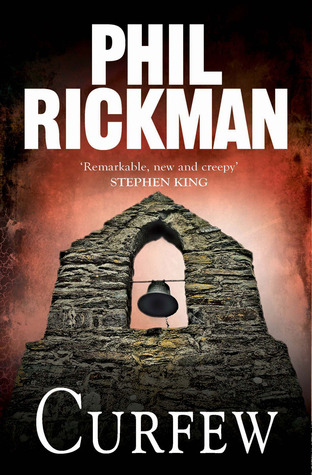Summary: The town of Crybbe has a nightly bell ringing to announce the coming of curfew. As outsiders clash with the townsfolk, the truth of the matter is right around the corner. Phil Rickman's 1994 novel, a mixture of horror and thriller and antiquarian adventure is a fine longer read that combines smarts with tension, but never talks down to the audience nor loses itself in lofty ambition.
Phil Rickman's Curfew
BLOT: (30 Oct 2013 - 07:49:23 PM)
Phil Rickman's Curfew
The Gist. In Crybbe, a border town between Wales and England, a nightly bell ringing is less a quaint custom and more a sign of a sickness underneath, a sickness that causes the mostly old and always somnolent townsfolk to clash with the outsiders as dark, beast-like shapes move on the old Tump and the long dead seep back into the lives of the living. Some outsiders are like Fay Morrison, there to take care of her troubled dad: on the edge of dementia and unexpectedly stuck to the place. Others, like Max Goff, are there to restructure the very roots of the town into a New Age Mecca. Goff wants more than a resort with a profitable business plan, he wants to bring the old standing stones back and to reawaken the lines of power that once pulsed through the area. When Goff brings in J.M. Powys, an author of a popular Earth Mysteries book, to chronicle the rebirth of the town, Powys begins to become a reluctant seeker of truth. Can he and Fay and friends find out what is actually going on—why there are no dogs in the town or why the townsfolk work so hard to keep their head down and what any of this has to do with the legend of Black Michael, a corrupt sheriff whose presence and legacy still haunts the area—or are these all Crybbe matters, dark secrets that outsiders can never penetrate?

Review. It is a testament to the power of
Score. 7/8. +1 if you like discussions about John Dee while finding yourself kind of freaked out by backwoods towns. -1 if you like your heroes more obviously heroic or get bored when action doesn't occur every page.
OTHER BLOTS THIS MONTH: October 2013
dickens of a blog




Written by Doug Bolden
For those wishing to get in touch, you can contact me in a number of ways

This work is licensed under a Creative Commons Attribution-ShareAlike 3.0 Unported License.
The longer, fuller version of this text can be found on my FAQ: "Can I Use Something I Found on the Site?".
"The hidden is greater than the seen."

